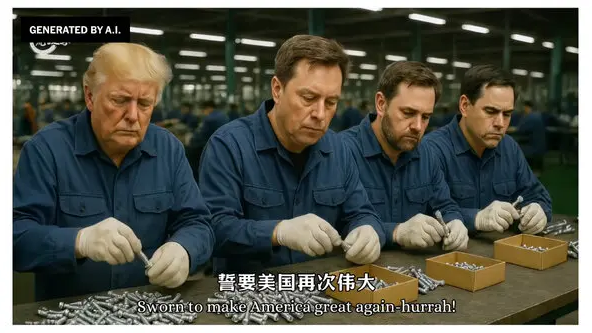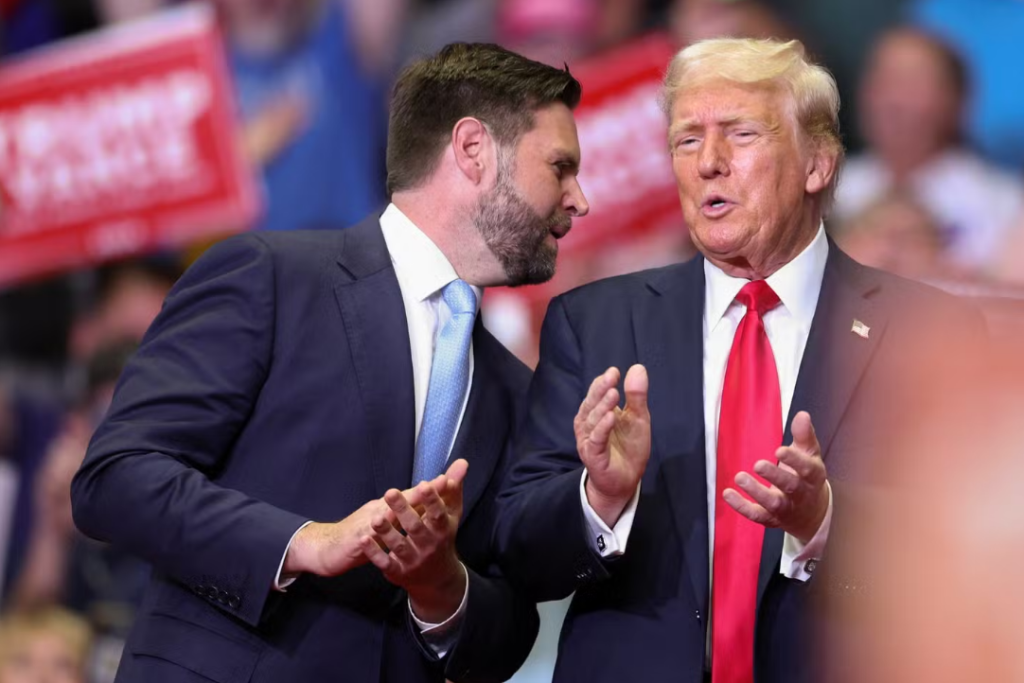In the wake of escalating trade tensions between the United States and China, a new form of digital protest has emerged on Chinese social media platforms. Utilizing artificial intelligence, users are generating satirical images and videos targeting U.S. President Donald Trump and Vice President JD Vance, mocking their administration’s tariff policies and highlighting the perceived repercussions on American workers.
AI-Generated Satire as a Form of Protest
Chinese netizens have turned to AI-generated content to express their disapproval of the U.S. administration’s trade measures. These digital creations depict Trump and Vance engaged in manual labor, such as assembling sneakers and smartphones in factory settings, underscoring the irony of policies intended to bolster American manufacturing potentially leading to increased domestic labor burdens. One notable video features AI-generated workers, resembling American figures, laboring in factories with traditional Chinese music playing in the background, culminating in the slogan “Make America Great Again” displayed prominently.

The Genesis of the Meme Movement
The proliferation of these AI-generated memes was catalyzed by Trump’s announcement of significant tariff increases on Chinese imports, with rates soaring up to 245%. Labeling April 2, 2025, as “Liberation Day,” Trump proclaimed it as the rebirth of American industry. In retaliation, China imposed its own tariffs, escalating the trade war and prompting a wave of digital satire from Chinese social media users.
JD Vance’s Controversial Remarks
Vice President JD Vance further inflamed tensions with a comment referring to “Chinese peasants” in the context of U.S. borrowing and trade. The remark, made during a Fox News interview, went viral on Chinese platforms like Weibo, amassing over 150 million views and drawing sharp criticism from both the Chinese public and officials. The Chinese Foreign Ministry condemned the statement as “ignorant and disrespectful,” exacerbating the diplomatic strain between the two nations.
The Role of AI in Modern Political Discourse
The use of AI-generated content in political satire represents a novel approach to international discourse, allowing individuals to craft compelling narratives that resonate widely. These digital artifacts serve not only as tools for humor but also as potent instruments of political commentary, reflecting public sentiment and influencing perceptions on a global scale.
Implications for U.S.-China Relations
The emergence of AI-driven satire underscores the complexities of the U.S.-China relationship, highlighting how technological advancements can be harnessed for both diplomatic engagement and dissent. As both nations navigate the intricacies of trade negotiations and geopolitical strategy, the digital realm has become an increasingly significant battleground for public opinion and influence.

Conclusion
In summary, the intersection of artificial intelligence and political satire has opened new avenues for expression and critique in the context of international relations. As the U.S. and China continue to grapple with economic and diplomatic challenges, the role of AI-generated content in shaping narratives and public perception is likely to grow, reflecting the evolving dynamics of global discourse.
A New Era of Digital Diplomacy and Dissent
The rise of AI-generated political satire in response to U.S.-China trade tensions marks a powerful shift in how international discourse unfolds in the digital age. What once might have been limited to official statements and press releases is now amplified through memes, deepfakes, and AI-generated imagery—shared instantly and widely across social media platforms. This movement reflects more than just humor; it’s a creative form of resistance and commentary that gives voice to public sentiment in ways traditional media often cannot. As U.S. leaders like Donald Trump and JD Vance continue to push aggressive trade policies, the digital responses from Chinese netizens signal a savvy and modern form of protest—one that blends technology, culture, and satire. In an increasingly interconnected world, the influence of artificial intelligence in shaping political narratives is undeniable. Whether viewed as clever protest or propaganda, these AI-generated images and videos are a reminder that diplomacy today is not just conducted across negotiating tables—but also across screens.

















